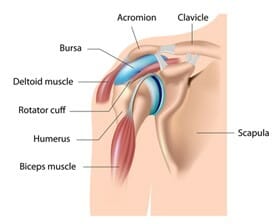By Consultant Orthopaedic Surgeon Hagen Jahnich
What is shoulder impingement?
Shoulder pain is a very common problem and can hit any age group. However “impingement” is most common, but not exclusive, in the age group of 40 to 60.
Impingement means that during use of the shoulder something catches and leads to referred pain (pain felt in another part of the body other than its source), typically into the side of the shoulder. But pain can also refer down the arm and up the neck. Impingement is a symptom, not a diagnosis!
Causes and treatment of shoulder impingement
There can be many causes for impingement; this article will highlight many of those.
The impingement pain may not originate in the shoulder at all. It can be referred from the neck, even the gall bladder or the heart and for instance, may be a sign of a slipped disc in the neck.
There may be no structural reason for such symptoms and simple muscle imbalance or poor posture are common causes. This is corrected by good physiotherapy and self help, like participating in Pilates.
If treatment after two months does not show any improvement then a formal assessment is required. Local and national guidelines suggest your GP should organise an X-ray of your shoulder. As long as the X-ray is normal, the trained therapist, the GP or the shoulder specialist may try a single injection with steroids.

An X-ray may identify calcium around the shoulder or bony spurs pressing onto the tendons of the shoulder. One could see early arthritis and many other problems. Calcium in the tendon can burst and irritate the shoulder. This leads to severe pain. A steroid injection, with or without image guidance, may settle things down again. But larger amounts of calcium may require to be removed by keyhole surgery (arthroscopy).
Bony spurs tend to form at the under surface of the tip of the shoulder (the acromion). Physiotherapy and injections are again the start of the management but when symptoms persist or if there is concern for the rotator cuff tendon, then keyhole surgery could be the answer. Furthermore, there may be arthritis in the ACJ (acromio-clavicular Joint, the joint between collar bone and shoulder blade). It may lead to localised pain but also to impingement. Often though, it is an incidental finding. Most X-rays will show some arthritis in the ACJ. However, if it is not the cause for symptoms then it should not be treated.
In my practice, I have seen many patients with persistent impingement, who in fact did not have impingement at all. The most common misdiagnosis is that of an idiopathic adhesive capsulitis – also known as a “frozen shoulder”.
Mr Jahnich
Stiffness should be the giveaway but may initially not be obvious. In the early phases of a “frozen shoulder” there may be no stiffness at all and it is the pain that simulates impingement. Frozen shoulders may resolve spontaneously with time, however, if established, and severe, they may need keyhole surgery to improve matters.
Unfortunately, there are occasionally more sinister reasons for shoulder pain. This is the reason why one should not ignore such problems. It may not necessarily be a tumour/cancer or similar but can be a tearing or torn tendon, which, if left untreated, may not be repairable in the future.
A shoulder specialist would be best placed to either reassure or diagnose the underlying problem correctly. Many treatments are now available. Physiotherapy may be appropriate if a tear has been present for a long time and is not repairable. Surgical options range from the above keyhole operations to joint replacements to address all sorts of causes of shoulder pain.

Mr Jähnich is a Consultant Orthopaedic Surgeon specialising in the management of upper limb problems. He is a specialist in shoulder & elbow surgery and runs a successful practice at the Horder Centre in Crowborough.
See profile
What makes Horder Healthcare unique
Horder Healthcare is committed to providing the very best quality of care for our patients and customers. We are continuously working on improving and reducing risks and this is reflected in our consistently high CQC results, patient satisfaction questionnaires and minimal levels of infection.
We are a charity
We reinvest our profit to benefit more people and help us achieve our aim of advancing health.






